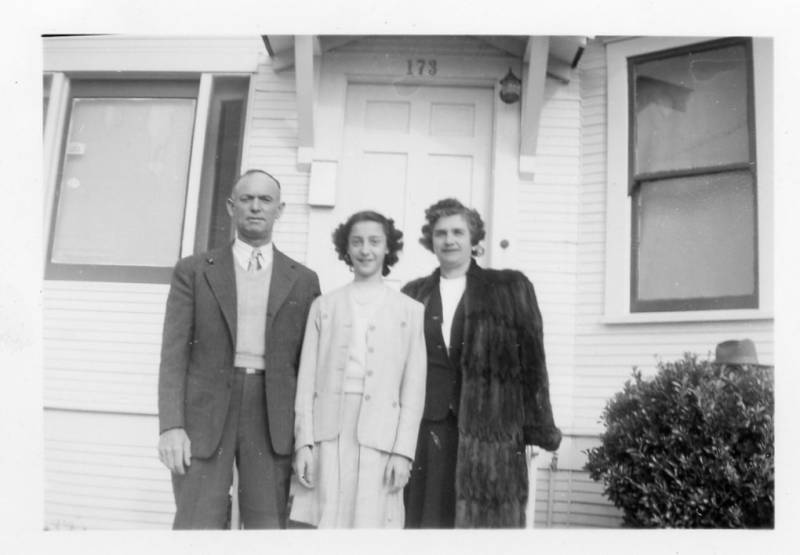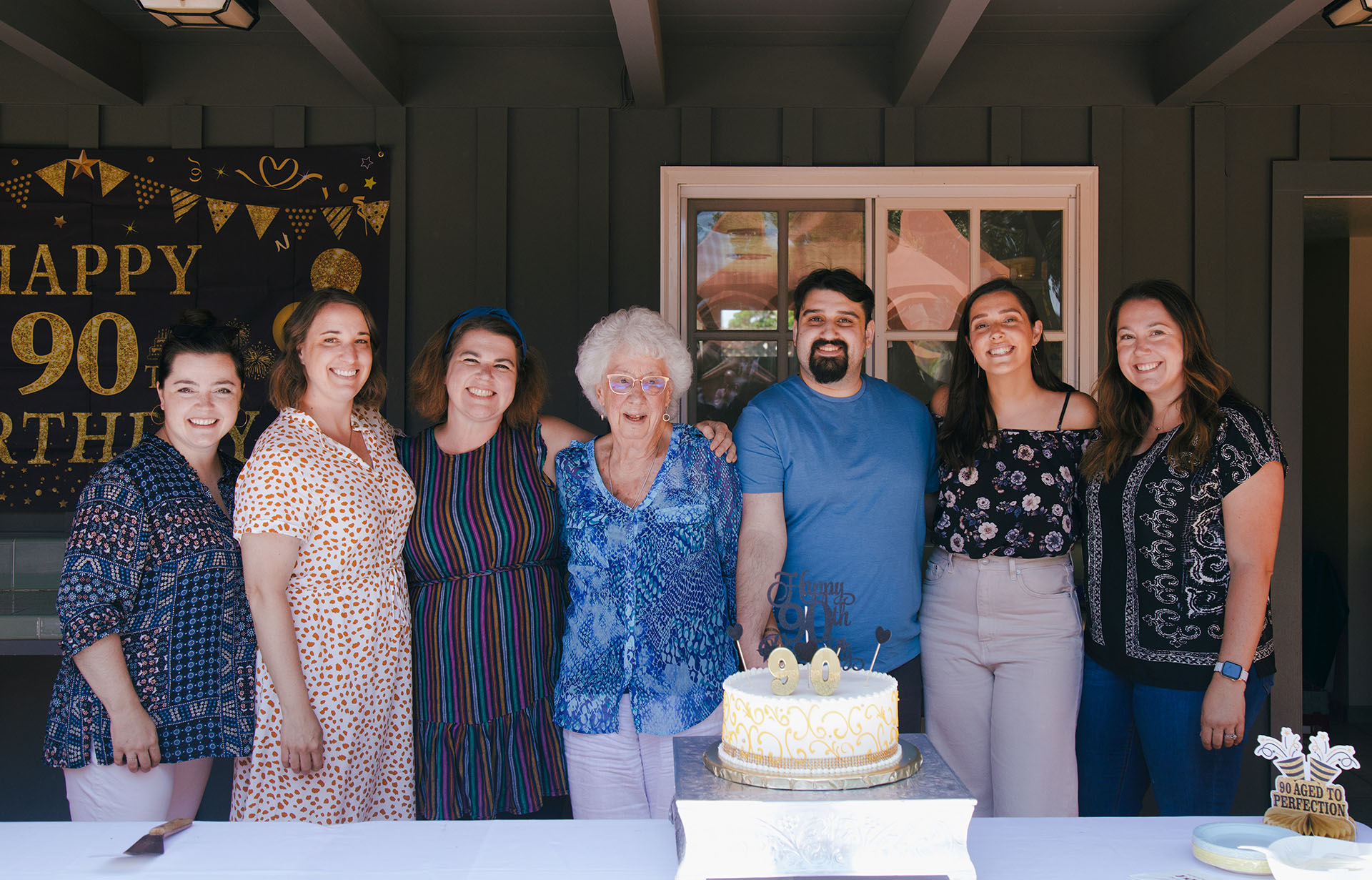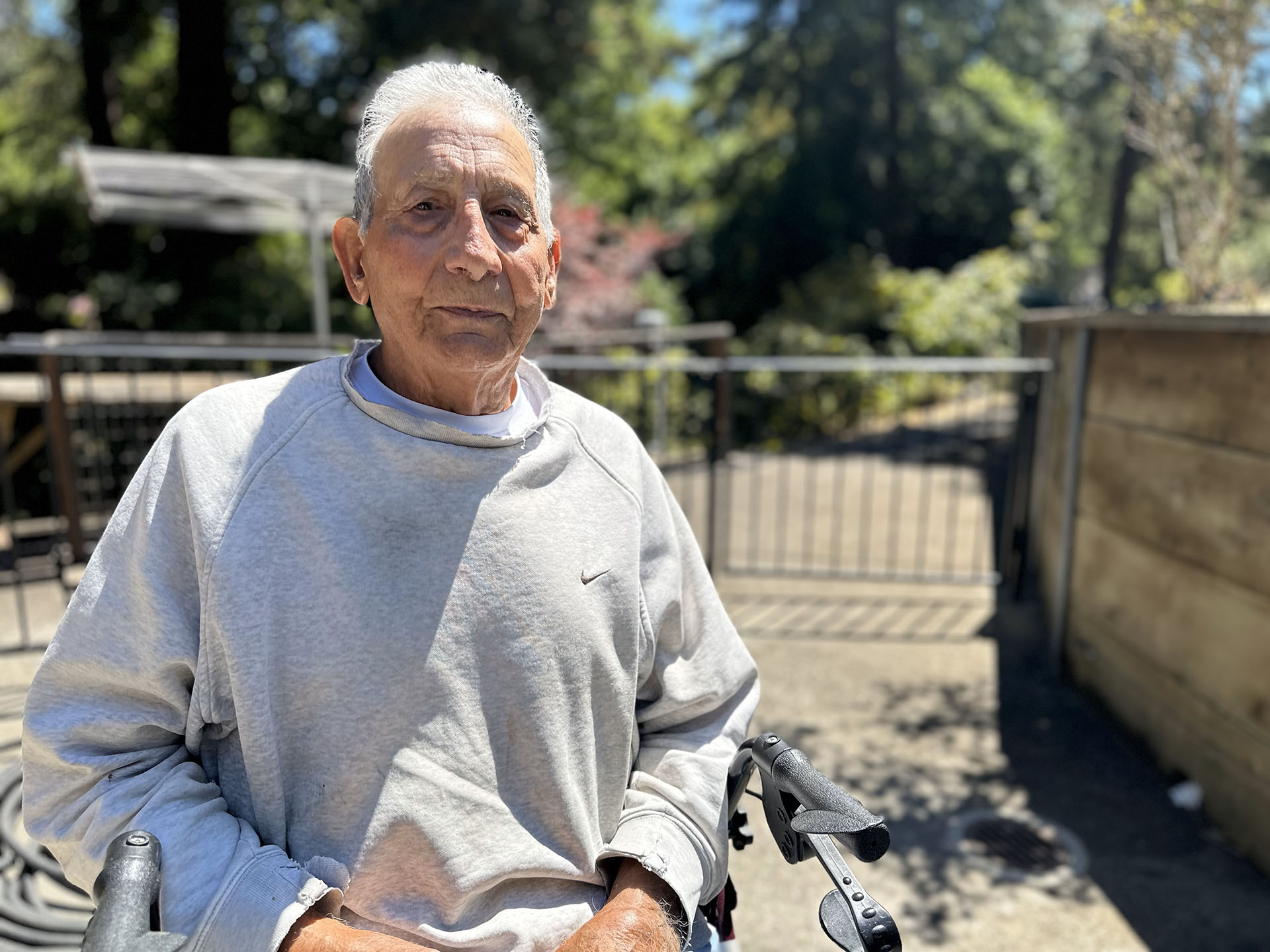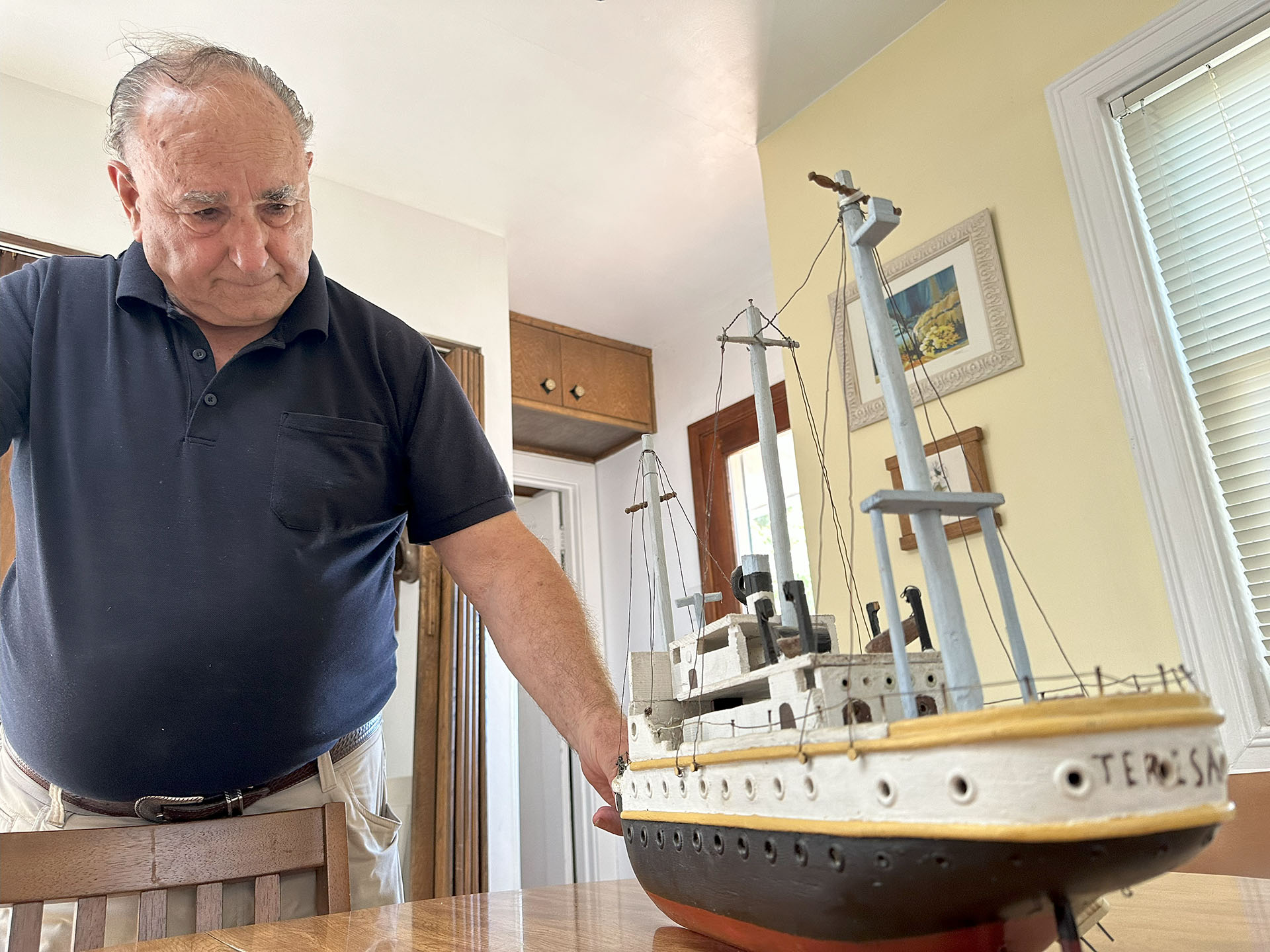Episode Transcript
Olivia Allen-Price: Around the holidays, family stories sometimes surface at the dinner table. Remember Grandma Joyce? She rode a motorcycle. Or Great Gran-Daddy Willie? He scrimped and saved long after the Depression was over.
Then there are tales like Becca Gularte recently heard from her grandma … about how her family was forced from their California home during World War 2. She hadn’t heard that one before.
Becca Gularte: It was, it was sort of with that, wait, why did you have to move across town kind of thing? And then she said, Oh, it was because we were Italians. And then we kept prompting her with questions to say, What do you mean It was because you were Italians?
Olivia Allen-Price: In the early 1940s, as more than 100,000 Japanese Americans were being sent to incarceration camps, other ethnic groups were also being targeted. Italian citizens living in California — some 10,000 of them — were forced to relocate.
Becca Gularte: We had all heard so much about Japanese internment growing up and and just really that being sort of the story, especially in California. And I think we were all just so surprised that this had happened to this whole other population of people.
Olivia Allen-Price: Becca and her husband wanted to know more, so they wrote to Bay Curious to find out how this bit of family history fits into California textbooks.
Becca Gularte: What types of restrictions like this were placed on Italian Americans during World War Two and why don’t more people know about it?
Olivia Allen-Price: Today on Bay Curious, we’re doing a deep dive into what Italians experienced in California during World War II and how it was different here from the rest of the country. I’m Olivia Allen-Price.
Producer Pauline Bartolone picks up the story from here.
Pauline Bartolone: To start investigating this question about how Italians were treated in California during World War two, we went straight to the source. Grandma… Our question-asker Becca Gularte’s grandma that is.
Laura Gularte: My name is Laura Neri Gularte. I’m 90 years old. I was born and grew up in Santa Cruz, California.
Pauline Bartolone: Laura Gularte now lives in Salinas. It was her father, Quinto Neri, who came to California in 1911 from Tuscany in Northern Italy. He was one of millions of Italians who came to the U.S. for a better life. Many stayed in urban centers like New York City, but others ventured farther to California, becoming fishermen, working in agriculture and the wine industry.
Laura Gularte: He came at age 17 because they were starving. It was a large family. And he knew some people in San Francisco who sponsored him. And so he went to work in Half Moon Bay.
Pauline Bartolone: Laura’s dad farmed Brussels sprouts and built a life for himself. He bought some land and a house. But then … the second World War hit and Italy declared war on the United States. Suddenly, Laura’s dad went from starting to achieve a middle-class life to being labeled ‘enemy alien.’
Archival audio of President Franklin Roosevelt: This war is a new kind of war. It is different from all other wars of the past…
Pauline Bartolone: The President of the United States at the time, Franklin Roosevelt gave military commanders sweeping rights to protect the homeland after the 1941 attack on Pearl Harbor. That’s what led to the mass incarceration of Japanese Americans. But since Italy and Germany had also declared war on the US, new restrictions applied to their citizens living here.
Archival audio of President Franklin Roosevelt: We shall give up conveniences and modify the routine of our lives if our country asks us to do so. We will do it cheerfully.
Pauline Bartolone: Italian citizens had to register as enemy aliens, and many were subject to an 8 p.m. curfew. They couldn’t travel more than 5 miles away from home. People’s houses were searched for so-called contraband, things like cameras and radios. People who violated the new rules could be arrested.
Archival audio of President Franklin Roosevelt: …remembering that the common enemy seeks to destroy every home and every freedom in every part of our land.
Pauline Bartolone: Italians on the West Coast were hit hardest by the new restrictions… The military forced Italian citizens, mostly living on the Pacific coastline, to find new homes. Defense commanders wanted to protect the Western U.S. from an enemy invasion so they created ‘prohibited zones’ where enemy aliens could not live or work… It included a sliver of land along the Pacific Ocean and some inland areas around military bases. Laura’s father had to relocate.
Laura Gularte: It had a big impact on my father because he was farming rented land that was in the restricted area. So he had to give up his farming. The fact that…he felt that he would not do anything against the United States and still had to be evacuated was hard.
Pauline Bartolone: Laura’s family found a new place to rent, ironically, on the other side of town that was not within the prohibited zone. Her mom was born in Argentina, so she was able to travel freely, but her dad was stuck at home. Laura was only seven years old at the time, so she didn’t understand much about the stresses her parents were feeling.
Laura Gularte: Parents did not discuss a lot of things with their children. I know they were upset because they had to leave their home. But they didn’t talk about it.
Lawrence DiStasi: They thought that Mussolini’s Navy might attack the West Coast. Of course, Mussolini didn’t have much of a Navy.
Pauline Bartolone: Author Lawrence DiStasi helped write a book on Italian Americans during World War 2. He says the West Coast General, John DeWitt, used his military powers in a much more draconian way than generals in other parts of the nation. It was DeWitt who commanded the incarceration of tens of thousands of Japanese Americans and the relocation of Italians on the West Coast. On the east coast Italians did have travel restrictions, but they weren’t subject to curfew or mass relocation, says DiStasi.
Lawrence DiStasi: The paranoia exhibited by the West Coast General, General John DeWitt…he was terrified that under his watch, the West Coast was going to be invaded. It never was, of course. It was partly hysteria, partly overkill.
Pauline Bartolone: Because of DeWitt’s relocation orders, Italians all around the Bay Area were in limbo — including thousands in the city of Alameda and Pittsburg. To those who had to move, the dividing line between what was restricted or not seemed pretty arbitrary.
Al Bruzzone: If you lived west of San Pablo Avenue, you had the move. If you lived east of San Pablo Avenue, you didn’t have to worry about it.
Pauline Bartolone: Al Bruzzone grew up in Richmond on a 40-acre lettuce farm. He’s 92 now but still remembers being 11 years old when the relocation orders came. It split his family up — he and his two younger siblings moved with his parents to Oakland. But his siblings, who were old enough to live by themselves and American-born, stayed in Richmond and worked the farm.
Al Bruzzone: On weekends, my brother Jim and I, we would go back. My brothers would pick us up, and we’d go back to where I was growing up.
Pauline Bartolone: Other Italians didn’t have the money to rent homes nearby after being forced to relocate. Many moved in with friends or lived in substandard migrant housing. Bruzzone thought the whole ordeal was a big government mistake.
Al Bruzzone: Most of the people came to this country because they were poor in Europe and they had a chance to accomplish something here. /// And they would never, never, never go fight against the country because they were doing so well here.
Pauline Bartolone: Italians who worked on the coast also suffered.. Eighty percent of California’s fishermen were Italian… and in 1942, their boats were seized by the coast guard. They were not allowed to fish on coastal waters.
Sound of papers rustling
Pauline Bartolone: That is a story that Ken Borelli knows personally. It happened to his uncle, Girolamo Cantatore.
Ken Borelli: We called him Uncle Jim, but his name was Girolamo. And he lived in San Francisco and was a crab fisherman. And they would fish out of Fisherman’s Wharf and go all up and down northern California.
Pauline Bartolone: After losing access to his vessel and the water during the war, Borelli’s uncle made a wooden replica of the boat. And Borelli still has it.
Ken Borelli: It’s called the Teresa. You can see this back here… he wrote that….
Pauline Bartolone: He shows me the 2-foot-long model boat, it’s super detailed, there are even lifeboats.
Ken Borelli: He was a very meticulous person.
Pauline Bartolone: Borelli wishes he could have asked his uncle how he felt back then. His family never told him the details about whether his uncle was compensated or saw the boat again. But Borelli says the boat replica shows his uncle had idle hands and a mind that needed to be occupied.
Ken Borelli: it was a yearning, as a yearning to go back to sea.
Pauline Bartolone: Italian Americans didn’t just endure forced relocation and lose property, hundreds more were sent to prison camps too. There, some slept in makeshift shelters like tents and were held with Japanese and German detainees,
Alice Yang: A lot of people mistakenly assume that Japanese Americans were the only ones affected by national security fears.
Pauline Bartolone: UC Santa Cruz historian Alice Yang says Italians and Germans living in the US also had their civil liberties infringed upon. People were imprisoned for being Italian journalists, teaching the Italian language or simply being veterans of World War 1.
Alice Yang: A lot of the assumptions about, you know, whether someone might be a security threat were based on prejudicial views of ethnicity…People who were part of organizations that were seen as promoting Italian pride. So in the pre-war period, that wasn’t considered dangerous or subversive, but in the wartime era. Right. Having ethnic pride, if your pride was associated with an axis power could land you on one of these lists.
Pauline Bartolone: To be clear, DiStasi says a good portion of Italian immigrants in the US at the time were supporters of Benito Mussolini, the Nazi-allied fascist leader of Italy. They may not have been in favor of what he did, but they liked that he was creating a new image for Italy.
Lawrence DiStasi: They felt that he had finally put Italy on the map and gained some respect for Italy and throughout the world….But that didn’t mean that they were going to engage in any kind of anti-American activities.
music of Ezio Pinza
Pauline Bartolone: High-profile Italian immigrants were prey to the wartime security measures. New York-based opera singer Ezio Pinza was incarcerated without charge for 3 months. Baseball Hall of Famer Joe DiMaggio’s mother, who lived in San Francisco, was arrested.
Imprisoned Italians were moved from camp to camp around the country, many winding up in Fort Missoula Montana.
Pauline Bartolone: Then, quite sharply, the American government changed its tune about Italians. In October 1942, Attorney General Francis Biddle gave a speech touting the contributions of Italians in the United States Army.
Voice actor for Attorney General Francis Biddle: Into the war against the Axis they have sent their own sons. These Americans of Italian ancestry will help Italy again to become a free nation. In each division of the United States Army; nearly five hundred soldiers, on the average, are the sons of Italian immigrants to America.”
Pauline Bartolone: By the end of the month, the restrictions on Italian citizens would end.
Voice actor for Attorney General Francis Biddle: To those who are affected by this change, ‘I say tonight:’You have met the test. Your loyalty to the democracy which has given you this chance, you have proved and proved well. Make the most of it. See to it that all Italians remain loyal.
Pauline Bartolone: Italians who were already in U.S. prisons stayed in camps for another year, but the relocated families in California, like Al Bruzzone and Laura Gularte — they got to go home. In total, they’d endured five months of a relocation order and about 8 months of curfews and travel restrictions.
Al Bruzzone: Somebody finally realized they made a mistake and they sent everybody home because … the parents had to move away and they were drafting all their children.
Pauline Bartolone: Laura Gularte says her dad lost his Brussels sprout farm near Santa Cruz. And it was hard to start all over again.
Laura Gularte: After they were able to go home, he never did go back to the farm. and he went to work for others in the agricultural industry…As I look back. I think that we were much luckier than the Japanese. Who were encamped and lost everything.
Pauline Bartolone: Many Italian immigrants in California were like Laura Gularte’s parents… They didn’t feel a need to talk about hardships imposed on them to their kids or grandkids. But Historian Alice Yang says there are important things to learn from this history. For one, not to judge whether someone’s dangerous based on their ethnicity.
Alice Yang: And that especially when people are afraid. It is very easy for them to have irrational fears of entire groups based on race, religion, ethnicity.




